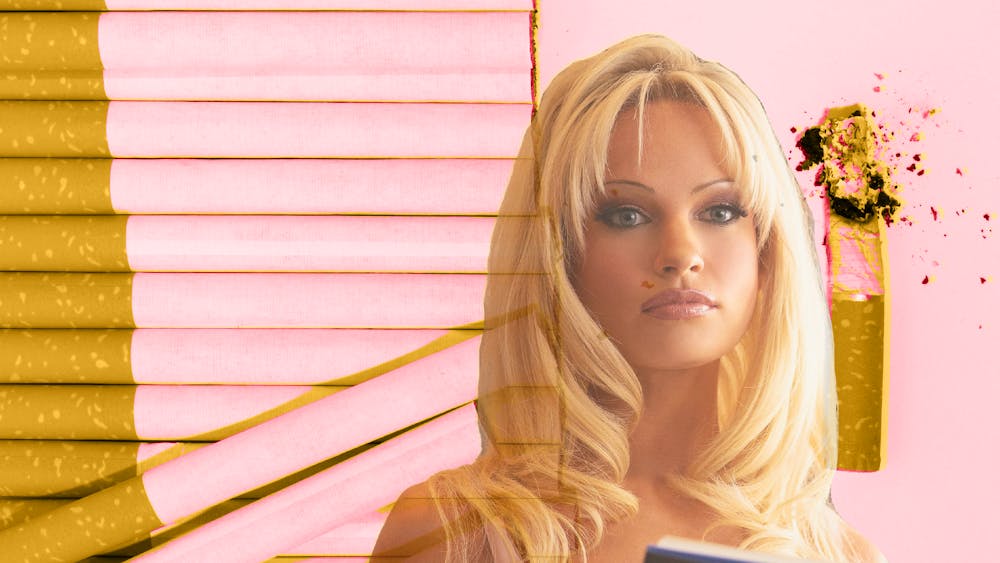It’s 2022, but on TikTok, it could be the ‘90s. Ever since the Hulu release of the limited miniseries Pam & Tommy, the iconic looks of Pamela Anderson have been making a resurgence. Across social media, it feels like Gen Z is trying to look like Gen X in their youth.
A TikTok filter, called “90s Pam Makeup,” gives users the signature Pamela Anderson look: thin eyebrows, plump lips, long lashes, and a smokey eye. With over 217,000 videos made as of April 2022, the filter is officially viral. While some TikTokers simply try out the filter to see how they look with ‘90s style makeup, a much more harmful trend is also starting to take place. People are comparing their use of the filter to the look of “cigarette moms" or "trailer park chicks," terms that invoke negative stereotypes of mothers in the lower or middle class who smoke cigarettes, and have been notoriously painted as incompetent mothers.
“I look like I’m dropping off my five kids with all different baby daddies at my mom’s then going to the bar but not before I pick up a pack of Marlboro menthols,” writes one user on her video with the 90s Pam Makeup filter on her face. Many on the app are using the filter alongside the term “cigarette mom” to insinuate “trailer trash” or “white trash,” a derogatory term to describe poor white people in the United States, especially those who live in rural and southern parts of the country.
As The Washington Post reports, poor Americans are “vilified, shunned, targeted and kept apart, both physically … and in the nation’s cultural imagination, where they have inspired mockery, kitsch and unceasing grimaces.”
However, while this mocking and othering continues on TikTok due to the linkage of the Pamela Anderson filter and the cigarette mom stereotype, some users are pointing out the classist undertones of this trend. “From a current cigarette mom who was raised by one,” writes one user on her own video with the filter, “y’all are acting like brats with your comments using this filter but I’ll still feed you, give you a ride to Walmart, fight your ex/[baby daddy], and you can crash at my mini home anytime. Real life will humble you quick, but we’ll still be here for you.”
“Take your Pam filter slander elsewhere,” another user chimes in. “My cigarette mom looked just like this and she brought me [McDonald's] after school every day and cornered my teenage cheer coach in the bathroom for bullying me.” The video was flooded with comments in defense of “cigarette moms,” stories about how these moms have supported their children and their friends, and call–outs of the trend as classist.
The Pamela Anderson and “cigarette mom” trend is not the first time that classist ideas have spread on TikTok. In the summer of 2020, the biggest trend on the app was the “chav check,” which made fun of the heavy makeup and clothing worn by “chavs,” a British slang term for young people typically of the working class who are characterized by brash behavior. Despite Americans believing that the trend was a harmless joke, the videos made under this trend actually fueled damaging stereotypes by making light of an aesthetic predominantly associated with people with lower incomes.
TikTok itself perpetuates classism as well. After a document given to TikTok employees was leaked, it revealed that the app’s main goals are bringing in new daily users and keeping them on the app for as long as possible through any means possible. The app goes to the extremes to do so—a 2020 report of intercepted documents from TikTok found that moderators were instructed to suppress videos made by users that came across as “too ugly, poor, or disabled for the platform.” Because of this, not only do trends on TikTok often reek of classism, but the app itself has an underlying exclusive agenda: to shut poor people out from internet success.
While the cigarette mom stereotype is just one instance of classism on TikTok, the viral nature of this trend is indicative of a larger problem on the app. On TikTok, it’s not just trends that make light of class inequalities—the app's direct suppression of content from poor creators further continues the perpetuation of classism across the platform.







